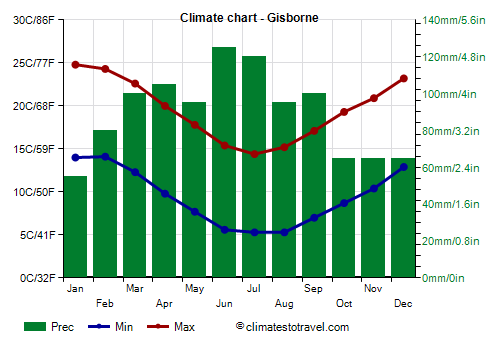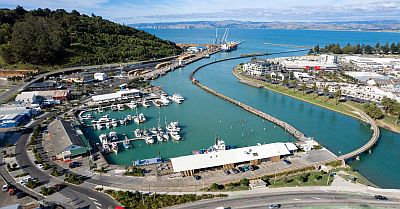Select units of measurement for the temperature and rainfall tables (metric or imperial).
Average weather, temperature, rainfall, sunshine hours

The climate of Gisborne is
oceanic, with mild, rainy winters (June to August) and fairly warm summers (December to February).
The city is located on the east coast of the North Island of New Zealand, at 38 degrees south latitude, in a small bay called Poverty Bay.

In
winter, sometimes there can be quite cold periods, with lows near freezing and highs of 10/12 °C (50/54 °F). At night, the temperature rarely drops below freezing. In the last thirty years it has dropped to -1 °C (30 °F). The coldest record is -3.3 °C (26.1 °F) and was set in June 1968.
Snow in Gisborne is extremely rare. Occasionally, such as in July 2015, a light snowfall can be observed, but the snow only settles on the hills around the city. The last time snow settled on the ground was in July 1939.
In
summer, the temperatures are usually pleasant, sometimes, however, there can be hot periods, with highs above 30 °C (86 °F), while in Auckland, which is exposed to the sea on two sides, this does not happen. The highest record is 38 °C (100.5 °F) and was set in January 1979. In January 2020 the temperature reached 37 °C (99 °F).
From time to time, the North Island can be affected by
tropical cyclones, which can leave the tropical zone and head south. In the last few decades, tropical cyclones or their remains have affected New Zealand from mid-December to April 20, with a higher frequency from January to March.
Best Time
The best time to visit Gisborne is the summer, from December to February, as it is the warmest and sunniest of the year. However, even in summer there may be periods that are rainy or windy, or during which it gets cool at night.
In addition, it should be remembered that tropical cyclones or their remnants can come from time to time.
For swimming, the ocean is very cool even in summer.
Gisborne - Climate data
In Gisborne, the
average temperature of the coldest month (July) is of
9.8 °C, that of the warmest month (January) is of
19.4 °C. Here are the average temperatures.
Gisborne - Average temperatures (1991-2020) |
| Month | Min | Max | Mean |
|---|
| January | 14 | 24.8 | 19.4 |
|---|
| February | 14.1 | 24.3 | 19.2 |
|---|
| March | 12.3 | 22.6 | 17.5 |
|---|
| April | 9.8 | 20 | 14.9 |
|---|
| May | 7.7 | 17.8 | 12.8 |
|---|
| June | 5.6 | 15.4 | 10.5 |
|---|
| July | 5.3 | 14.4 | 9.8 |
|---|
| August | 5.3 | 15.2 | 10.2 |
|---|
| September | 7 | 17.1 | 12 |
|---|
| October | 8.7 | 19.3 | 14 |
|---|
| November | 10.4 | 20.9 | 15.6 |
|---|
| December | 12.9 | 23.2 | 18 |
|---|
| Year | 9.4 | 19.6 | 14.45 |
|---|
amounts to
1050 millimeters per year: it is therefore quite abundant. It ranges from
55 millimeters in the driest month (January) to
125 millimeters in the wettest one (June). Here is the average precipitation.
Gisborne - Average precipitation| Month | Days |
|---|
| January | 55 | 7 |
|---|
| February | 80 | 8 |
|---|
| March | 100 | 9 |
|---|
| April | 105 | 9 |
|---|
| May | 95 | 10 |
|---|
| June | 125 | 10 |
|---|
| July | 120 | 12 |
|---|
| August | 95 | 11 |
|---|
| September | 100 | 9 |
|---|
| October | 65 | 8 |
|---|
| November | 65 | 8 |
|---|
| December | 65 | 8 |
|---|
| Year | 1050 | 108 |
|---|
The
sea temperature ranges from
14.5 °C in August, September to
20.5 °C in February. Here are the average sea temperatures.
Gisborne - Sea temperature| Month |
|---|
| January | 19.5 |
|---|
| February | 20.5 |
|---|
| March | 20 |
|---|
| April | 19 |
|---|
| May | 17.5 |
|---|
| June | 16 |
|---|
| July | 15 |
|---|
| August | 14.5 |
|---|
| September | 14.5 |
|---|
| October | 15 |
|---|
| November | 16.5"> |
|---|
| December | 18 |
|---|
| Year | 17.1 |
|---|
There are on average around 2220
sunshine hours per year. Here are the average hours of sunshine per day.
Gisborne - Sunshine hours| Month | Average | Total |
|---|
| January | 8 | 250 |
|---|
| February | 7 | 200 |
|---|
| March | 6 | 190 |
|---|
| April | 5.5 | 165 |
|---|
| May | 4.5 | 145 |
|---|
| June | 4.5 | 130 |
|---|
| July | 4 | 125 |
|---|
| August | 5.5 | 165 |
|---|
| September | 6 | 180 |
|---|
| October | 7 | 220 |
|---|
| November | 7 | 220 |
|---|
| December | 7.5 | 230 |
|---|
| Year | 6.1 | 2220 |
|---|